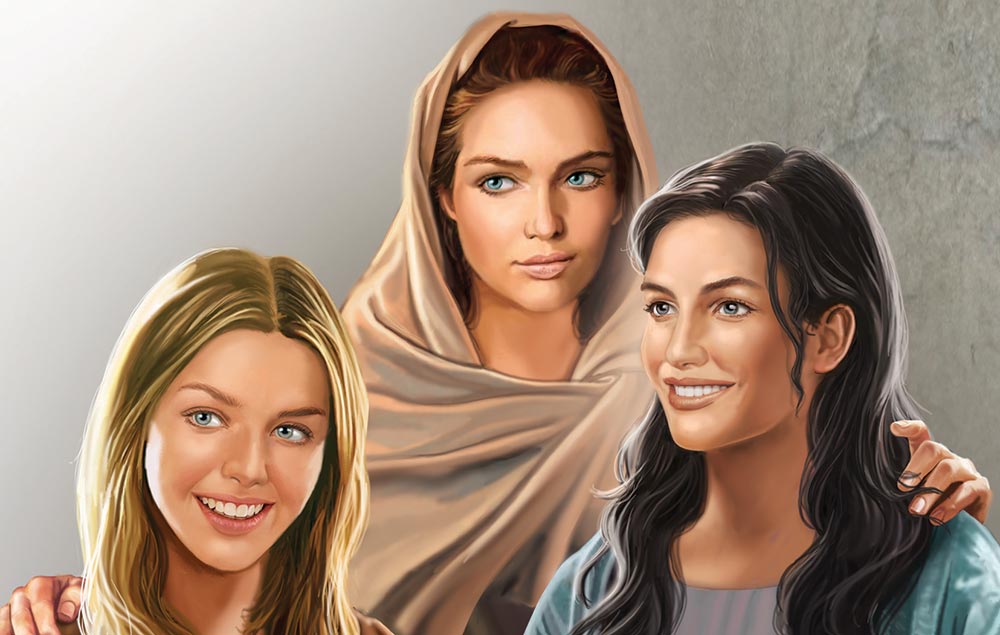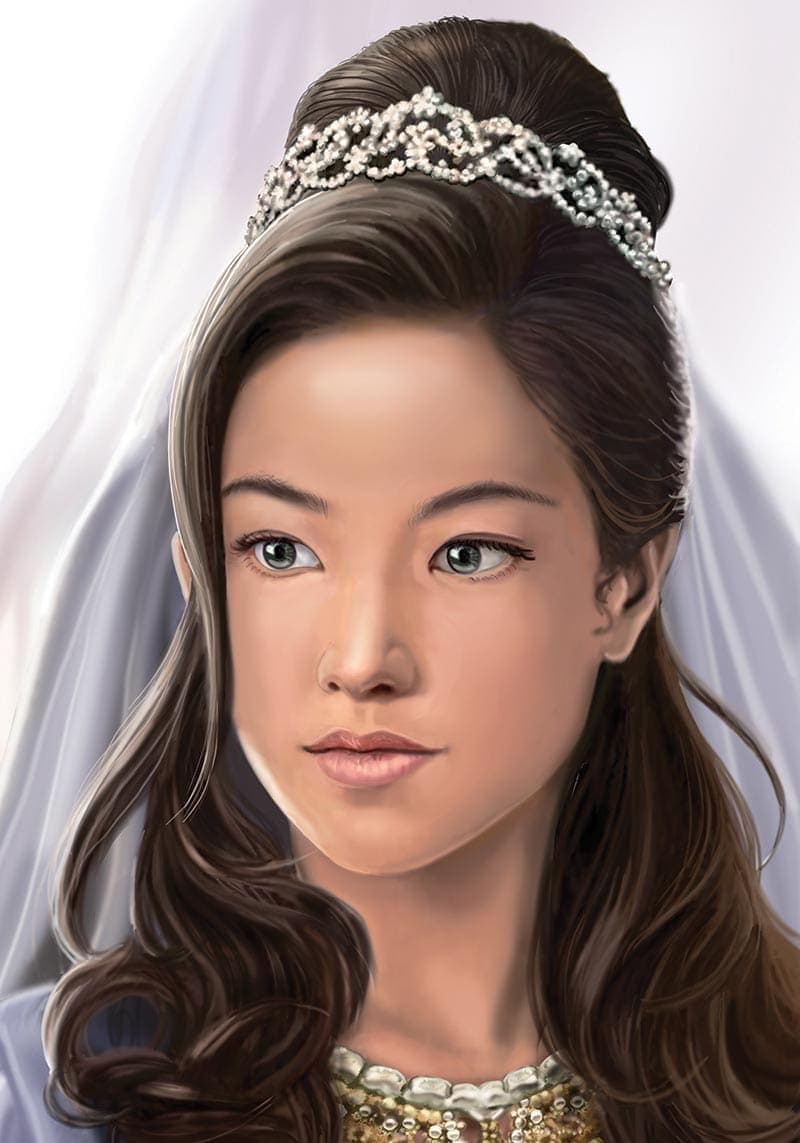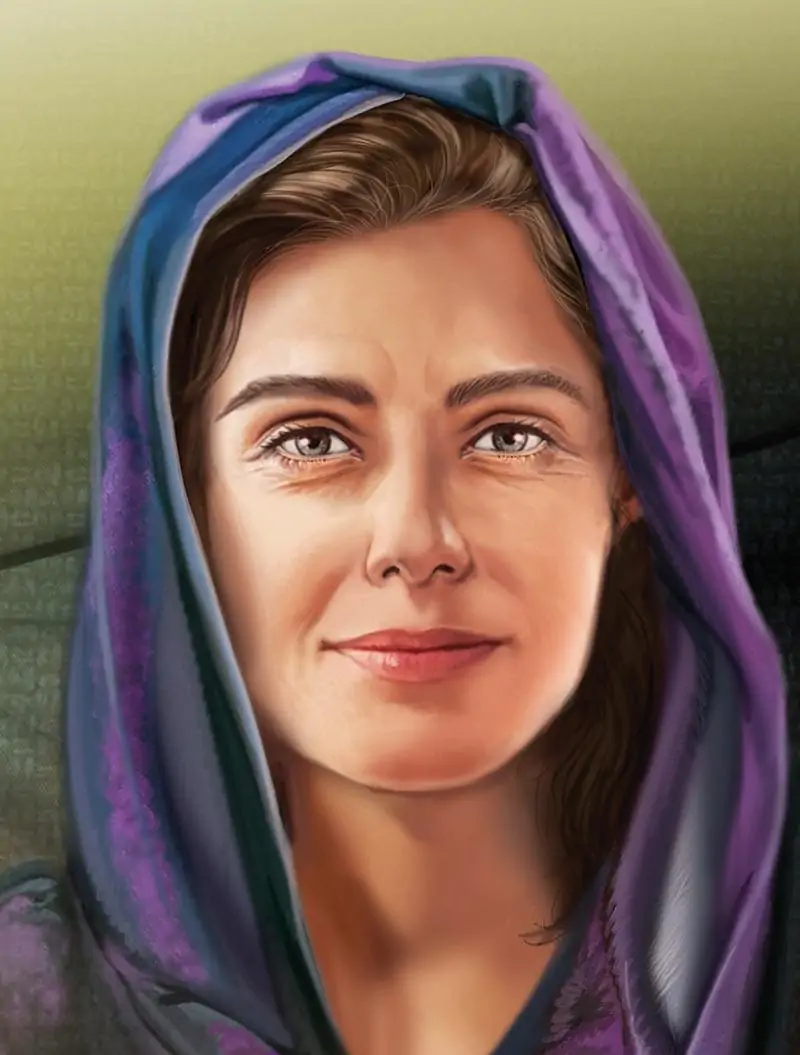
When we think about women in the Bible, we often think of such well-known women as Esther, Ruth, Rahab, Mary, Deborah, etc. Here we focus on six of them, three of whom are better known, and three who are not as popular; three of whom are from the Old Testament era, and three from the New Testament. Most of them are known for their initiatives or deeds of character, but there are two of them whose strengths are not as highlighted.
The six women I have chosen to shine a light on are Jochebed, Jemima, Vashti, Dorcas, Rhoda, and Lois. Their stories, and some lessons we can learn from these daughters of God, are told in a new way in the
Women’s Bible, a coproduction of Safeliz Publishing House and General Conference Women’s Ministries, first published in 2014. The novelty of this telling involves a combination of textual narrative and drawings.
Joao Luis Cardoso, a South American artist, dedicated almost a full year of his life to the task of first imagining and then graphically portraying 30 of the Bible’s best known Bible women.
1 Mario Martinelli, chief executive officer of Adventism’s Safeliz Publishing House in Spain, personally managed the Women’s Bible project over the three years it took from its conception to its execution. Martinelli speaks of artist Cardoso enthusiastically, describing him asa faithful Seventh-day Adventist, a good father, a faithful husband, and a committed Christian. He worked continuously on the task of graphic depiction over a period of 10 months, spending an average of one week on each of his subjects. His goal was not only to imagine and portray them in their life settings, but also to communicate through his drawings something of the respect and admiration he feels for them and for women everywhere who are constantly making unselfish contributions to family, church, and society all around the world. In selecting the models he would work with for the project, Cardoso aimed to depict the peculiarities of each Bible character. He first established the profile each illustration should have, then chose the model who best fitted the profile.2
(Ex. 2:1-10; 6:20; Num. 26:59)
Apparently her name derives from two Hebrew terms, one being an abbreviation of the sacred name Yahweh and the other meaning “glory”; thus, “Yahweh is glory.” She was the daughter of Levi, wife of Amram, and mother of Miriam, Aaron, and Moses, an Israelite living in Egypt during the Hebrews’ enslavement by the pharaohs. From the pen of an inspired woman, Ellen G. White, Jochebed is the recipient of one of the most sterling compliments ever paid a woman anywhere, within or outside of the Bible: “Jochebed was a woman and a slave. Her lot in life was humble, her burden heavy. But through no other woman, save Mary of Nazareth, has the world received greater blessing.”
3
By order of the pharaoh of Egypt, Moses, her son, like all the Hebrews’ sons of the time, was born to feed the crocodiles of Egypt’s Nile River. But mother Jochebed would not readily surrender her child. She would give him to the river, but not to its crocodiles. Her plan to keep her son alive was ingenious. She placed him in the river, within sight of the pharaoh’s daughter, then had her own daughter, Miriam, offer the princess a nurse for the baby. Who would that nurse be? Jochebed herself. The baby given to the river not for sacrifice, but for safety, was nursed at the empire’s expense by his own ingenious mother. In time she would give Moses up to the pharaoh’s daughter to be adopted, but not before instilling in him an unconquerable love for and loyalty to the true and living God. What she taught him, “no after influence could induce Moses to renounce.”
4
Trained at the palace, he became master of all the arts and smarts of the Egyptians (Acts 7:22), but never came to consider himself an Egyptian. Instead, Jochebed’s surrendered son would be God’s man to lead his people, her people, God’s people, out of bondage in the greatest liberation story the world would ever know except for Christ’s deliverance of all of lost humanity from sin and everlasting doom.
Jochebed’s story is more than an example for women; it is the story of what women do. They give up everything for their children, as many times as it takes in order to save them. It is in a woman’s nature to care for others, even at the expense of herself. Through Jochebed’s life women can see the importance of developing strategic plans to move their projects forward and care for others, rather than just letting life happen. They must learn to be copartners with God, not passive and inactive.
5

(Job 42:14, 15)
Jemima (“dove”) was the eldest of three daughters who were born to Job after his time of severe trial. Jemima also had seven brothers. Her beauty and that of her sisters attracted high praise: “In all the land were found no women sobeautiful as the daughters of Job” (Job 42:15). All three of them, along with their brothers, received an inheritance of land (verses 13-15). She was part of the blessing that God gave to her father, Job, after his trials so that it could be seen that “the Lord blessed the latter days of Job more than his beginning” (verse 12).
In this story a beautiful daughter who inherits property from her father is held up as partial proof of God’s blessing to him. Her success in coming to own land suggests that Job is no different from any other father who is proud of his girls. The text is a positive statement without any modifiers or word of detraction, remarkable for what it says about both Jemima and Job. The prevailing culture of Old Testament Bible times allowed no woman to inherit property until God instructed Moses to honor the petition of Zelophehad’s “five fine females.” These women approached Moses courageously, asking to be recognized as heirs of their father’s property. Their request was a challenge to the existing standard, but Moses was willing to consider this new idea, rather than dismissing them with a legitimate answer about such a thing being unheard-of. He would talk to God about it: “So Moses brought their case before the Lord” (Num. 27:5).
God’s answer to Moses was categorical: “The daughters of Zelophehad speak what is right; you shall surely give them a possession of inheritance among their father’s brothers, and cause the inheritance of their father to pass to them” (verse 7). Achsah too, at the start of the period of the judges, shows initiative in requesting property from her father, Caleb. First she urges her husband to ask her father for a field (Judges 1:14). Later she engages Caleb directly, and he honors her request: “She said to him, ‘Give me a blessing; since you have given me land in the South, give me also springs of water.’ And Caleb gave her the upper springs and the lower springs” (verse 15).
As best we know, Jemima and her sisters lived before these times—before Achsah’s confidence, and before Zelophehad’s five got the rule changed. Unlike those women, Jemima does not seem to have initiated a request for land, something that may have come across as inappropriate pride or assertiveness. Her story reflects every woman’s dream—that she will have a father who is proud of her, considers her beautiful (in all the land), and trusts her with his possessions in a manner equal to his sons.
6
(Esther 1)
Vashti (“beautiful”) was wife to the king of Persia, Ahasuerus. Her story is the beginning of the story of Esther.
Vashti is known for refusing to appear before the king and his guests at his extravagant feast that had already been going on for six months (Esther 1:4) when the events that would cancel her and introduce Esther took place. Her reason for refusing the king’s invitation is unknown. Perhaps it was because of the feast she was holding for the women in the palace at the same time (verse 9), or her desire not to appear before drunken men. Suffice to say, her refusal infuriated the king (verse 12), and left him with the embarrassment of being publicly rebuffed. The situation required meetings of the high council to determine what should be done to restore the dignity and authority of the monarch (verses 13-21). In the end, the king’s choice to replace her involved a lengthy process through which Esther emerged as Vashti’s successor (Esther 2:1-17).
Vashti’s actions remind us that for every action there is a reaction. The consequences of disobedience relate directly to the context: although they are told not to touch the stove, the consequence of disobeying that order is not compellingly clear to the toddler if the stove is turned off and cold. But a different context—a hot stove—will produce a memorably different experience, the kind that teaches moral consequence much more forcefully. Israel’s King Saul could not see very clearly what the consequence of disobedience was when he brought back fine Amalekite sheep and a manacled king as prizes of the victor in war: he could make great impressions on both his own subjects and any potential enemies by showing how he could humiliate a mighty enemy king. And as for the sheep, they would be great for either sacrifice or rearing. The consequences of disobeying God are not always clear. But obedience is still better than sacrifice (1 Sam. 15:22).
Often enough, women think that their motives, rather than their actions, will determine their life’s consequences. Despite their idealism, this is often not the case. As the popular saying goes: “Actions speak louder than words.” It would be helpful, then, if women took their own actions more seriously. Mothers in particular must realize that while they may see themselves as insignificant, they are the principal transmitters of culture with all its mores and folkways, regulations and traditions, spoken and unspoken norms. Their actions affect all kinds of people around them: the character and history of their own times, as well as those who come after them—the culture of future generations. Nothing said here about principled moral living is part of some appeal for women to take sides for Queen Vashti or for men to unite in sympathy for King Ahasuerus against rebellious wives. What we do see is that both the king’s invitation and the queen’s actions are of consequence to others far beyond themselves, despite what liberated humanists sometimes try to argue. Actions have consequences. In Vashti’s case those consequences acted as doors for someone else to walk through.
Nothing said here about principled moral living is part of some appeal for women to take sides for Queen Vashti or for men to unite in sympathy for King Ahasuerus against rebellious wives. What we do see is that both the king’s invitation and the queen’s actions are of consequence to others far beyond themselves, despite what liberated humanists sometimes try to argue. Actions have consequences. In Vashti’s case those consequences acted as doors for someone else to walk through.
7
(Acts 9:36-43)
Dorcas (“gazelle”) is introduced to us as “a disciple” whose Greek name seemed to matter. Her story’s introduction recognizes her as having a Jewish name. The immediate translation of that name is followed by a narrative that all the way through identifies her according to her Greek name: “At Joppa there was a certain disciple named Tabitha, which is translated Dorcas” (Acts 9:36). Later, commenting on the sorrow of those deprived of her love by her death, the record says they wept and showed Peter “the tunics and garments which Dorcas had made while she was with them” (verse 39). Peter does use her Hebrew name, Tabitha, when he calls her back to life (verse 40). But the reference to her Greek name as soon as she is introduced, and the widows’ sorrow at the loss of Dorcas, communicate a sense of how she was looked upon by the public she ministered to.
Dorcas was much loved because she was “full of good works and charitable deeds” (verse 36). The community was so moved by her death that they persuaded Peter to come from the neighboring town of Lydda. We are not told what they asked Peter to come for. We do not know if they expected what happened when he arrived. But we know that her Greek neighbors thought of her as one of their own, Dorcas. She lived it, and they loved it. And when Peter prayed over her and then presented her back to the community alive, they were beside themselves with joy. They could not be silenced; and their amazing story brought people into the church in great numbers: “It became known throughout all Joppa, and many believed on the Lord” (verse 42).
The numbers of women who give to their communities as the Jewish woman Tabitha did deserves to grow and increase. The world needs, and God’s cause needs, Tabithas who are celebrated as Dorcases: people who so give of themselves that those whom they bless count them as their own. And when the ministry of Dorcas takes hold, everything they invest returns many times over in how they are remembered later, and in what they leave behind. Miracles may follow that go far beyond their feeding the hungry and warming the cold, naked, exposed, and marginalized. Women of this type have been mentors for others who then carry on their work when they are gone.
8
(Acts 12:13-16)
Rhoda (“rose”) was a servant in the home of Mary, the mother of John Mark. At the time of her story Peter had been taken prisoner by King Herod, and the church had come together to pray for him at Mary’s house. While they were praying, there was a knock on the door, and Rhoda went to answer it. The story seems to take a rather strange twist when Rhoda asks who is there, and is told that it is Peter. She recognizes his voice and runs off to tell the others, but fails to open the door for him to enter.
While the text is at first humorous, we may grant that Rhoda is not the only one “beside herself” on this night. Peter, freed from prison by an angel, took his own while to become fully aware that it was “real.” He cannot be blamed for thinking it might be “a vision.” It took a while for him to “come to himself” (verses 5-11).
There are times in life that an event is so incredible that we cannot take it in. And this is true of both disappointments and positive events. Weddings, births, baptisms, or good news of any kind can be so overwhelming that we lose ourselves in the wake of events, forgetting where we are or what we are doing. This can be a wonderful forgetfulness, and is evidence of God’s ability to surprise us and give us joy.
9
(2 Tim. 1:5)
Lois was the grandmother of Timothy through his mother, Eunice.
Her story is summed up in a letter from Paul to Timothy: “I recall your sincere faith that was alive first in your grandmother Lois and in your mother Eunice, and I am sure is in you” (2 Tim. 1:5, NET).
10 Paul seeks comfort in two things: his own clear conscience, grounded and confident in the faith of his ancestors; and in the sincere faith of Timothy, grounded in the training of his mother and grandmother. This short text reflects the power of the generations to pass on values. The text also reflects the power of memory. Paul is not present with Lois, but her faith, as seen through Eunice and Timothy, was “alive” and is a comfort and joy as he remembers it.
Our lives on earth are short, and we seek in every way to live them for God during the time we have. But more important may be the way we are remembered and the influence we have on generations after us. That influence will be most profound if our faith is deep, genuine, and “alive.” Imagine: Once we are gone, those after us may remember us and be comforted and filled with joy. Imagine further: The faith they remember emboldens them to greater work. Lois’s life also reveals the power of Scripture and a good teacher. Paul says to Timothy, “You know who taught you and how from infancy you have known the holy writings, which are able to give you wisdom for salvation. Every scripture is inspired by God . . . , that the person dedicated to God may be capable and equipped for every good work” (2 Tim. 3:14-17, NET).
11
What powerful lessons we can learn as we study women and men in the Bible. However, we need to do more than just read the verses. We can look up Bible dictionaries and commentaries to find out more about the persons we are reading about. In these books we can find more information about the culture or times the person lived in. And finally, the Holy Spirit will show us how to apply these truths to our own lives.
I have enjoyed using my
Women’s Bible through these years. Also, many women have told me the same. I met a sister once whose Women’s Bible showed much wear and tear from frequent use. She told me that she read her Bible many times during the day and was strengthened by what she read. What a lesson for us all.
Heather-Dawn Small directs the Women’s Ministries Department of the General Conference of Seventh-day Adventists, Silver Spring, Maryland, United States.